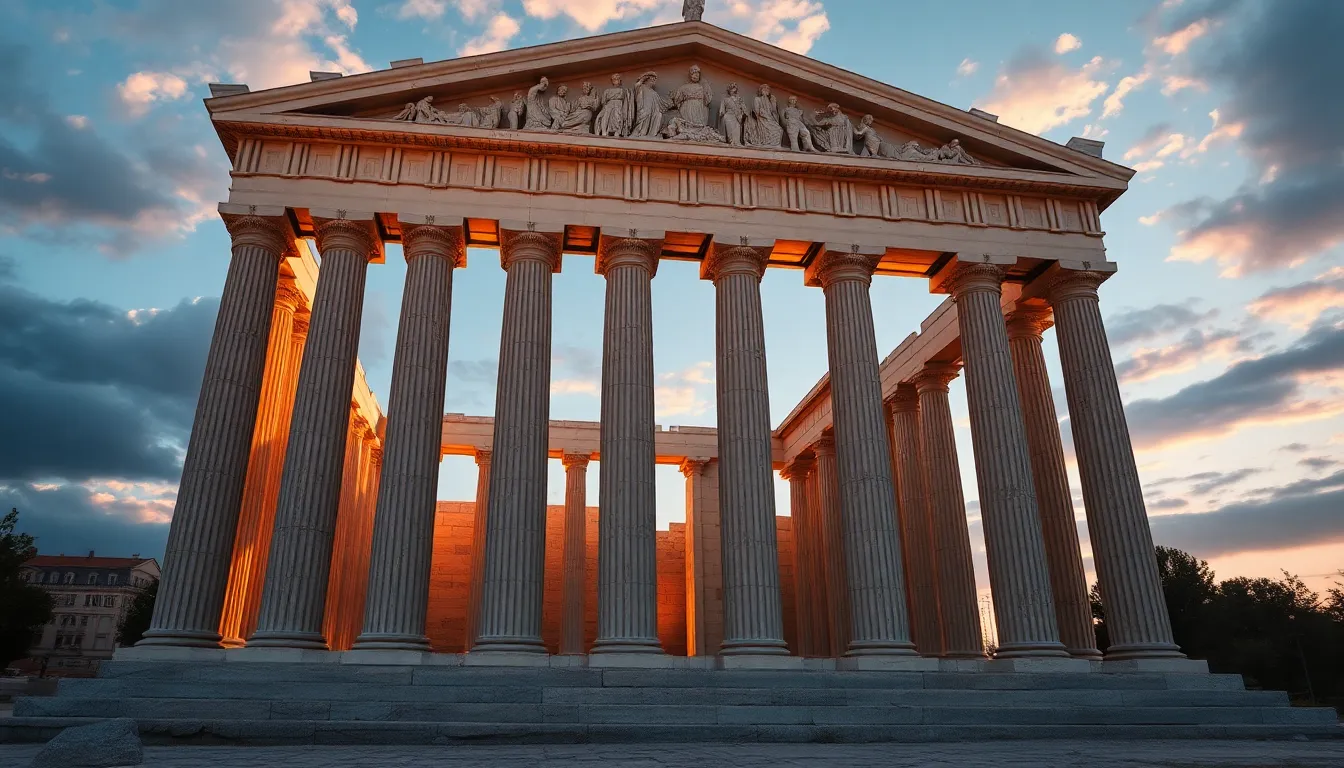How the Greek Pantheon Reflects Ancient Greek Society and Culture
I. Introduction
The Greek pantheon is a rich tapestry of deities, each representing various aspects of life, nature, and human experience. From the king of gods, Zeus, to the goddess of wisdom, Athena, these figures played a pivotal role in the lives of ancient Greeks. Greek mythology, infused with captivating tales and moral lessons, was not merely entertainment; it was a fundamental component of societal identity and cultural expression.
This article aims to explore how the Greek pantheon reflects the values, beliefs, and dynamics of ancient Greek society, connecting the divine to the everyday lives of its people.
II. The Structure of the Greek Pantheon
A. Major deities and their domains
The Greek pantheon is structured around major deities who govern various domains:
- Zeus – King of the gods, god of the sky and thunder.
- Hera – Queen of the gods, goddess of marriage and family.
- Poseidon – God of the sea, earthquakes, and horses.
- Athena – Goddess of wisdom, warfare, and crafts.
- Apollo – God of the sun, music, and prophecy.
- Aphrodite – Goddess of love and beauty.
B. Minor gods and goddesses and their roles
In addition to the major deities, numerous minor gods and goddesses represent specific aspects of life, such as:
- Hecate – Goddess of magic and witchcraft.
- Pan – God of nature and the wild.
- Nemesis – Goddess of retribution.
These figures often symbolize the diverse experiences and challenges faced by individuals in society.
C. The significance of divine hierarchy in reflecting societal structure
The hierarchy within the pantheon mirrors the social order of ancient Greece, where power dynamics and societal roles were clearly defined. The ruling gods held authority akin to kings and leaders, while lesser deities represented the common populace. This structure reinforced the values of respect for authority and the natural order of life.
III. Mythology as a Reflection of Human Experience
A. Themes of love, power, and conflict in myths
Greek mythology is rich with themes that resonate with the human experience:
- Love: The passionate tales of Eros and Psyche illustrate the complexities of love and desire.
- Power: The struggles for power among gods, particularly in the tales of Zeus and Cronus, reflect human political dynamics.
- Conflict: The Trojan War encapsulates the themes of honor, betrayal, and heroism.
B. The portrayal of human flaws and virtues through gods
The gods were depicted with human-like qualities, exhibiting both virtues and flaws. For example, Zeus, while powerful, was known for his infidelities, illustrating the complexities of human nature and morality.
C. Myths as moral lessons and cultural narratives
Many myths served as moral lessons, warning against hubris or emphasizing the importance of virtues such as bravery and wisdom. These narratives provided cultural frameworks for understanding the human condition and societal norms.
IV. The Role of Religion in Daily Life
A. Worship practices and rituals associated with the pantheon
Religion permeated daily life in ancient Greece. Worship practices included:
- Offering sacrifices to the gods at temples.
- Praying for guidance and favor in personal and communal endeavors.
B. Festivals and public celebrations (e.g., the Olympics)
Festivals such as the Panathenaea and the Olympic Games celebrated the gods and fostered community spirit. These events were critical for social cohesion and cultural identity.
C. The integration of mythology into social customs and traditions
Mythology influenced various aspects of life, from naming conventions to marriage customs, showcasing the deep-rooted connection between the divine and the mundane.
V. The Influence of Geography and Environment
A. The relationship between natural phenomena and deities
Geography significantly impacted the attributes of the gods. For instance, Poseidon represented the sea, reflecting the importance of the ocean to Greek civilization.
B. Regional variations in worship and beliefs
Different regions of Greece had distinct cults and practices, often centered around local deities, illustrating the variability of worship across the landscape.
C. The impact of geography on the stories and attributes of gods
Geographical features, such as mountains and rivers, were often personified as gods or spirits, linking the environment directly to the spiritual beliefs of the people.
VI. Gender Dynamics and the Representation of Deities
A. The roles and portrayals of male vs. female gods
The Greek pantheon showcases a variety of male and female deities, each with distinct roles. For example:
- Athena: Represents wisdom and strategy.
- Ares: Embodies the chaos of war.
B. Feminine deities and their influence on women’s roles in society
Goddesses like Demeter and Artemis played crucial roles in agriculture and nature, influencing women’s roles as caretakers and providers.
C. Gender roles as reflected in myths and their societal implications
Myths often reinforced gender roles, showcasing both the strengths and limitations placed on individuals based on their gender, which echoed societal expectations.
VII. Artistic and Literary Expressions of the Pantheon
A. Representation of gods in ancient art and architecture
The depiction of gods in sculptures, pottery, and architecture reflected their importance in daily life. Temples, such as the Parthenon, were dedicated to specific deities, showcasing their significance.
B. Influence of mythology on literature and theater
Literary works by figures like Homer and Euripides drew heavily on mythological themes, influencing storytelling and the exploration of human nature.
C. The legacy of Greek mythology in Western art and culture
Greek mythology continues to inspire artists and writers across the globe, shaping cultural narratives and artistic expressions in contemporary society.
VIII. Conclusion
In summary, the Greek pantheon is a profound reflection of ancient Greek society, revealing insights into their beliefs, values, and social structures. The interplay between mythology and daily life underscores the enduring legacy of these ancient narratives in understanding both past and present cultures.
As we reflect on the themes and stories of the Greek pantheon, we recognize their continued relevance in modern discussions about identity, morality, and human experience.




